Features
A year into Rajapaksa presidency amidst Covid-19 pandemic

by Harim Peiris
The Rajapaksa administration completed its first year in office, a few days ago, with Sri Lanka being in the midst of a raging Covid-19 second wave, which has seen confirmed cases of the virus in the country, pass the 20,000 mark, with the highly populated and economically crucial Western Province, being the new epicentre.
Twelve months, since the historic and momentous victory of the ruling Sri Lanka Podujana Peramuna (SLPP) and its presidential candidate, have passed quickly. With a year that was dominated by the twenty first century’s first global pandemic, to perhaps the Spanish flu about a century ago. Sri Lanka dealt with the first wave earlier this year, relatively successfully with few infections and single digit Covid-19 related deaths. The newly installed SLPP / Rajapaksa Administration claimed credit for an efficient epidemic management and possibly reaped some political benefit from the same, winning an unexpected and massive two-thirds majority in the general elections to parliament in August this year. Surpassing the seat tally received by a prior Rajapaksa Administration, under the UPFA banner, in the post war euphoria, elections of 2010. Quite a credit then to the current Rajapaksa administration, for surpassing itself.
However, the political year 2019/20, was not without its significant events, which will shape Sri Lankan national life for the next few years. First, it is the absolute implosion of the United National Party and the emergence of young Sajith Premadasa as both the credible runner-up in the presidential race and the new Leader of the Opposition. Replacing long serving UNP leader and former Prime Minister, Ranil Wickremesinghe, whose refusal to concede defeat in his internal political battle with his erstwhile deputy, has resulted in the weakest political opposition in a decade, seriously weakening the checks and balances so essential in a democratic society. But a political transition has taken place, in both government and Opposition from Mahinda to Gotabaya and Ranil to Sajith.
Militarization of civilian space and centralization of political power
Probably, the most defining aspect of the current Rajapaksa administration is the militarisation of civilian space in public administration and governance. While Prime Minister and former President Mahinda Rajapaksa ascended to the apex of national governance through the democratic political process, the path which brought younger sibling and current President Gotabaya Rajapakas to power, lay through a career in the military, culminating in the highest office in the Ministry of Defence. Accordingly, governance under the current Rajapaksa administration has been dominated by the military, either serving or retired. The Covid-19 public health emergency has been placed under the serving Army Commander, rather than the Health Minister or the Health Ministry. Accordingly, there has been criticism of a reduction in health expenditure, lack of any increase in hospital bed capacity and Sri Lanka’s relatively low rate of Covid-19 testing.
Most of the high official positions in the administration including foreign affairs, health, ports and customs among others are occupied by retired or serving senior military men, competent undoubtedly, but not from the civilian Sri Lanka Administrative Service. Other key government functions seem to be allocated to presidential tasks forces, headed and dominated by military and security personnel, rather than relevant line ministries. Accordingly, such objectives as the Eastern Province archeological site preservation and the creation of a disciplined and virtuous society have been entrusted to military task forces.
The centralisation of political power in the executive presidency through the recently enacted 20th Amendment to the Constitution, mostly rolls back the modest democratic gains associated with the 19th Amendment to the Constitution, and once again establishes Sri Lanka’s executive president as an elected absolute ruler. The administration required the help and support of some breakaway Opposition Muslim MPs to manage and mitigate its own internal dissent on the 20th Amendment.
A Covid-19 influenced economic meltdown
A significant factor in the single term demise of the Sirisena / Wickremesinghe Administration and the return to power of the Rajapaksas was likely the dismal governance performance, the anaemic economic growth and the absence of a peace dividend during the 2015 to 2019 period. Recognising this and that generally good economics is always good politics; the Rajapaksa administration has been keen to try and up its economic management game. This attempt has been seriously stymied by the Covid-19 pandemic and the effect of the lockdowns and the airport shutdown on the tourism and general services sectors. We are headed for a recession in excess of perhaps negative five percent (-5%), though we would have to await the Central Bank reports for the exact figure. The administration doesn’t really seem to have an answer to the serious economic challenges ahead, with their first budget earlier this month, seemingly more wishful than realistic or pragmatic.
A serious foreign policy tilt to China
Also, in the area of foreign policy, Sri Lanka’s decades long and carefully crafted non-aligned and neutral foreign policy, which followed a balance between the competing interests of major powers in the region, including of India, seems to have been jettisoned in favour of a serious pivot towards China, notwithstanding government lip service to the contrary. This is unwise and weakens key relationships with our largest trading partner the United States and, of course, our historical and huge sub continental neighbour India, to the detriment of our own national interests.
The first year of the new Rajapaksa administration would draw mixed reviews, dominated as it has been by the Covid-19 pandemic and its management, but pursuing and implementing policies, which avoid serious scrutiny and debate, precisely because of the pandemic. But those policies and their effects will be keenly felt and should be more closely examined later on in the administration’s term of office.
(The writer served as Advisor, Ministry of Foreign Affairs from 2016-2017)
Features
RIDDHI-MA:
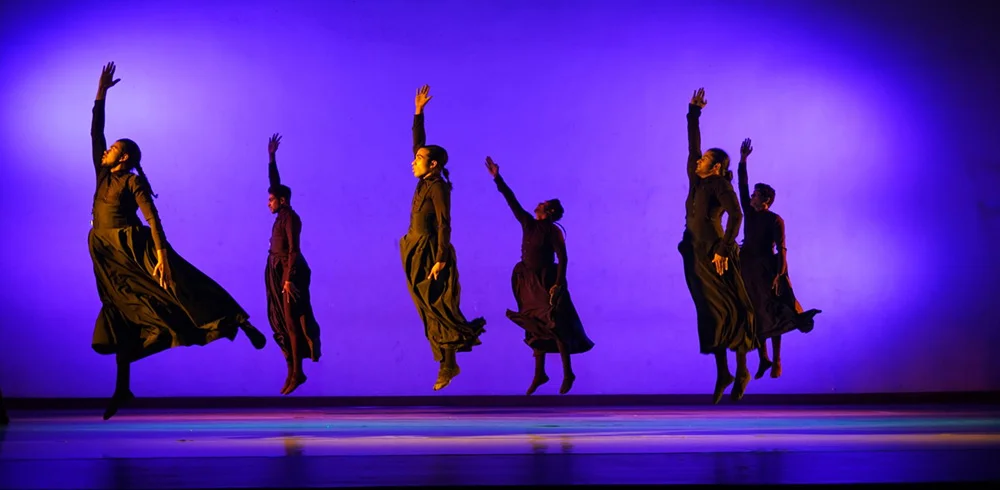
A new Era of Dance in Sri Lanka
Kapila Palihawadana, an internationally renowned dancer and choreographer staged his new dance production, Riddhi-Ma, on 28 March 2025 at the Elphinstone theatre, which was filled with Sri Lankan theatregoers, foreign diplomats and students of dance. Kapila appeared on stage with his charismatic persona signifying the performance to be unravelled on stage. I was anxiously waiting to see nATANDA dancers. He briefly introduced the narrative and the thematic background to the production to be witnessed. According to him, Kapila has been inspired by the Sri Lankan southern traditional dance (Low Country) and the mythologies related to Riddhi Yâgaya (Riddi Ritual) and the black magic to produce a ‘contemporary ballet’.
Riddhi Yâgaya also known as Rata Yakuma is one of the elaborative exorcism rituals performed in the southern dance tradition in Sri Lanka. It is particularly performed in Matara and Bentara areas where this ritual is performed in order to curb the barrenness and the expectation of fertility for young women (Fargnoli & Seneviratne 2021). Kapila’s contemporary ballet production had intermingled both character, Riddi Bisaw (Princes Riddhi) and the story of Kalu Kumaraya (Black Prince), who possesses young women and caught in the evil gaze (yaksa disti) while cursing upon them to be ill (De Munck, 1990).
Kapila weaves a tapestry of ritual dance elements with the ballet movements to create visually stunning images on stage. Over one and a half hours of duration, Kapila’s dancers mesmerized the audience through their virtuosic bodily competencies in Western ballet, Sri Lankan dance, especially the symbolic elements of low country dance and the spontaneity of movements. It is human bodily virtuosity and the rhythmic structures, which galvanised our senses throughout the performance. From very low phases of bodily movements to high speed acceleration, Kapila managed to visualise the human body as an elevated sublimity.
Contemporary Ballet
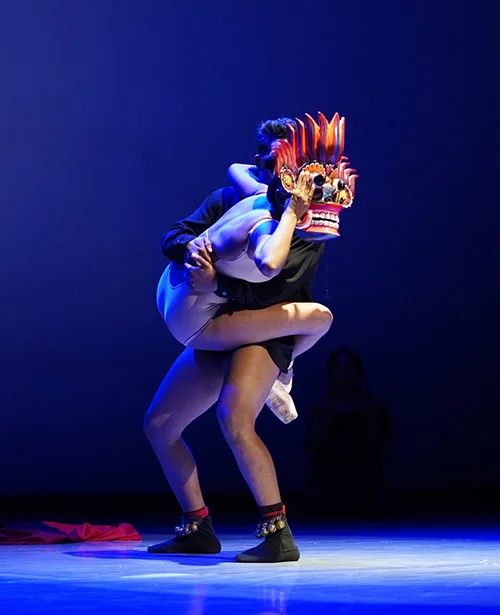
Figure 2 – (L) Umesha Kapilarathna performs en pointe, and (R) Narmada Nekethani performs with Jeewaka Randeepa, Riddhi-Ma, at Elphinstone Theatre, Maradana, 28th March 2025. Source:
Malshan Witharana
The dance production Riddhi-Ma was choreographed in several segments accompanied by a flow of various music arrangements and sound elements within which the dance narrative was laid through. In other words, Kapila as a choreographer, overcomes the modernist deadlock in his contemporary dance work that the majority of Sri Lankan dance choreographers have very often succumbed to. These images of bodies of female dancers commensurate the narrative of women’s fate and her vulnerability in being possessed by the Black Demon and how she overcomes and emancipates from the oppression. In this sense, Kapila’s dancers have showcased their ability to use the bodies not much as an object which is trained to perform a particular tradition but to present bodily fluidity which can be transformed into any form. Kapila’s performers possess formlessness, fluid fragility through which they break and overcome their bodily regimentations.
It was such a highly sophisticated ‘contemporary ballet’ performed at a Sri Lankan theatre with utmost rigour and precision. Bodies of all male and female dancers were highly trained and refined through classical ballet and contemporary dance. In addition, they demonstrated their abilities in performing other forms of dance. Their bodies were trained to achieve skilful execution of complex ballet movements, especially key elements of traditional ballet namely, improvisation, partnering, interpretation and off-balance and the local dance repertoires. Yet, these key ballet elements are not necessarily a part of contemporary ballet training (Marttinen, 2016). However, it is important for the dance students to learn these key elements of traditional ballet and use them in the contemporary dance settings. In this sense, Kapila’s dancers have achieved such vigour and somatic precision through assiduous practice of the body to create the magic on stage.
Pas de deux
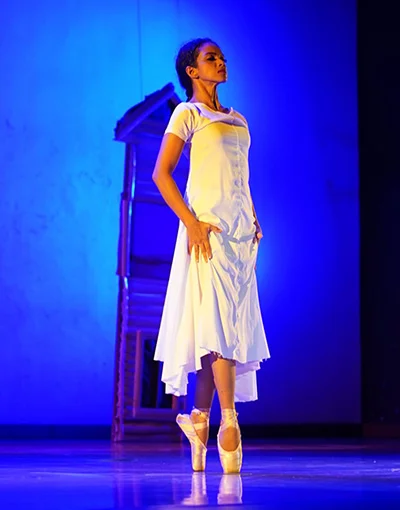
Among others, a particular dance sequence attracted my attention the most. In the traditional ballet lexicon, it is a ‘pas de deux’ which is performed by the ‘same race male and female dancers,’ which can be called ‘a duet’. As Lutts argues, ‘Many contemporary choreographers are challenging social structures and norms within ballet by messing with the structure of the pas de deux (Lutts, 2019). Pas de Deux is a dance typically done by male and female dancers. In this case, Kapila has selected a male and a female dancer whose gender hierarchies appeared to be diminished through the choreographic work. In the traditional pas de deux, the male appears as the backdrop of the female dancer or the main anchorage of the female body, where the female body is presented with the support of the male body. Kapila has consciously been able to change this hierarchical division between the traditional ballet and the contemporary dance by presenting the female dominance in the act of dance.
The sequence was choreographed around a powerful depiction of the possession of the Gara Yakâ over a young woman, whose vulnerability and the powerful resurrection from the possession was performed by two young dancers. The female dancer, a ballerina, was in a leotard and a tight while wearing a pair of pointe shoes (toe shoes). Pointe shoes help the dancers to swirl on one spot (fouettés), on the pointed toes of one leg, which is the indication of the ballet dancer’s ability to perform en pointe (The Kennedy Centre 2020).
The stunning imagery was created throughout this sequence by the female and the male dancers intertwining their flexible bodies upon each other, throwing their bodies vertically and horizontally while maintaining balance and imbalance together. The ballerina’s right leg is bent and her toes are directed towards the floor while performing the en pointe with her ankle. Throughout the sequence she holds the Gara Yakâ mask while performing with the partner.
The male dancer behind the ballerina maintains a posture while depicting low country hand gestures combining and blurring the boundaries between Sri Lankan dance and the Western ballet (see figure 3). In this sequence, the male dancer maintains the balance of the body while lifting the female dancer’s body in the air signifying some classical elements of ballet.
Haptic sense

Figure 3: Narmada Nekathani performs with the Gara Yaka mask while indicating her right leg as en pointe. Male dancer, Jeewaka Randeepa’s hand gestures signify the low country pose. Riddhi-Ma, Dance Theatre at Elphinstone Theatre, 28th March 2025. Source: Malshan Witharana.
One significant element of this contemporary ballet production is the costume design. The selection of colour palette, containing black, red and while combining with other corresponding colours and also the costumes which break the traditional rules and norms are compelling. I have discussed in a recent publication how clothes connect with the performer’s body and operate as an embodied haptic perception to connect with the spectators (Liyanage, 2025). In this production, the costumes operate in two different ways: First it signifies sculpted bodies creating an embodied, empathic experience.
Secondly, designs of costumes work as a mode of three dimensional haptic sense. Kapila gives his dancers fully covered clothing, while they generate classical ballet and Sinhalese ritual dance movements. The covered bodies create another dimension to clothing over bodies. In doing so, Kapila attempts to create sculpted bodies on stage by blurring the boundaries of gender oriented clothing and its usage in Sri Lankan dance.
Sri Lankan female body on stage, particularly in dance has been presented as an object of male desire. I have elsewhere cited that the lâsya or the feminine gestures of the dance repertoire has been the marker of the quality of dance against the tândava tradition (Liyanage, 2025). The theatregoers visit the theatre to appreciate the lâsya bodies of female dancers and if the dancer meets this threshold, then she becomes the versatile dancer. Kandyan dancers such as Vajira and Chithrasena’s dance works are explored and analysed with this lâsya and tândava criteria. Vajira for instance becomes the icon of the lâsya in the Kandyan tradition. It is not my intention here to further discuss the discourse of lâsya and tândava here.
But Kapila’s contemporary ballet overcomes this duality of male-female aesthetic categorization of lâsya and tândava which has been a historical categorization of dance bodies in Sri Lanka (Sanjeewa 2021).
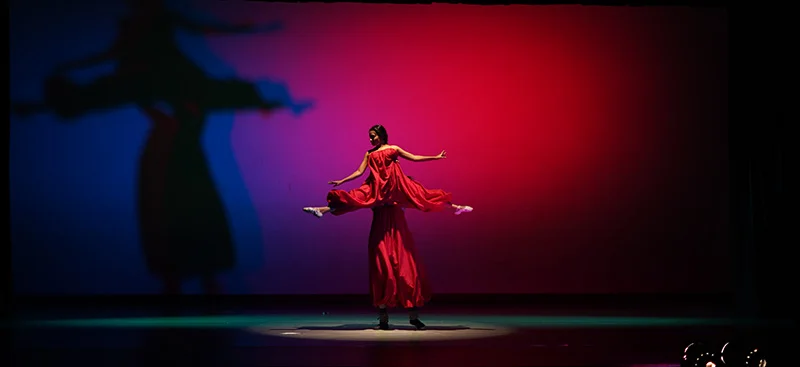
Figure 4: Riddhi-Ma’s costumes creates sculpted bodies combining the performer and the audience through empathic projection. Dancers, Sithija Sithimina and Senuri Nimsara appear in Riddhi-Ma, at Elphinstone Theatre, 28th March 2025, Source, Malshan Witharana.
Conclusion
Dance imagination in the Sri Lankan creative industry exploits the female body as an object. The colonial mind set of the dance body as a histrionic, gendered, exotic and aesthetic object is still embedded in the majority of dance productions produced in the current cultural industry. Moreover, dance is still understood as a ‘language’ similar to music where the narratives are shared in symbolic movements. Yet, Kapila has shown us that dance exists beyond language or lingual structures where it creates humans to experience alternative existence and expression. In this sense, dance is intrinsically a mode of ‘being’, a kinaesthetic connection where its phenomenality operates beyond the rationality of our daily life.
At this juncture, Kapila and his dance ensemble have marked a significant milestone by eradicating the archetypical and stereotypes in Sri Lankan dance. Kapila’s intervention with Riddi Ma is way ahead of our contemporary reality of Sri Lankan dance which will undoubtedly lead to a new era of dance theatre in Sri Lanka.
References
De Munck, V. C. (1990). Choosing metaphor. A case study of Sri Lankan exorcism. Anthropos, 317-328. Fargnoli, A., & Seneviratne, D. (2021). Exploring Rata Yakuma: Weaving dance/movement therapy and a
Sri Lankan healing ritual. Creative Arts in Education and Therapy (CAET), 230-244.
Liyanage, S. 2025. “Arts and Culture in the Post-War Sri Lanka: Body as Protest in Post-Political Aragalaya (Porattam).” In Reflections on the Continuing Crises of Post-War Sri Lanka, edited by Gamini Keerawella and Amal Jayawardane, 245–78. Colombo: Institute for International Studies (IIS) Sri Lanka.
Lutts, A. (2019). Storytelling in Contemporary Ballet.
Samarasinghe, S. G. (1977). A Methodology for the Collection of the Sinhala Ritual. Asian Folklore Studies, 105-130.
Sanjeewa, W. (2021). Historical Perspective of Gender Typed Participation in the Performing Arts in Sri Lanka During the Pre-Colonial, The Colonial Era, and the Post-Colonial Eras. International Journal of Social Science And Human Research, 4(5), 989-997.
The Kennedy Centre. 2020. “Pointe Shoes Dancing on the Tips of the Toes.” Kennedy-Center.org. 2020 https://www.kennedy-center.org/education/resources-for-educators/classroom-resources/media- and-interactives/media/dance/pointe-shoes/..
Acknowledgements
The author wishes to thank Himansi Dehigama for proofreading this article.
About the author:
Saumya Liyanage (PhD) is a film and theatre actor and professor in drama and theatre, currently working at the Department of Theatre Ballet and Modern Dance, Faculty of Dance and Drama, University of the Visual and Performing Arts (UVPA), Colombo. He is the former Dean of the Faculty of Graduate Studies and is currently holding the director position of the Social Reconciliation Centre, UVPA Colombo.
Features
Sri Lanka’s Foreign Policy amid Geopolitical Transformations: 1990-2024 – Part II
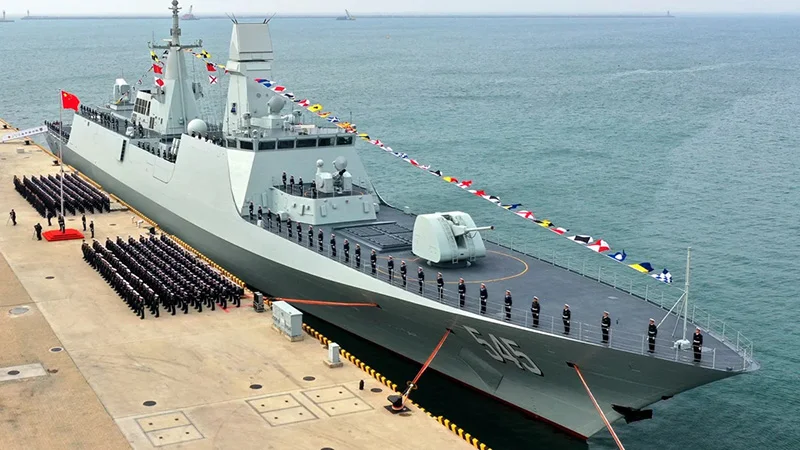
Chinese Naval Entry and End of Post-War Unipolarity
The ascendancy of China as an emerging superpower is one of the most striking shifts in the global distribution of economic and political power in the 21st century. With its strategic rise, China has assumed a more proactive diplomatic and economic role in the Indian Ocean, signalling its emergence as a global superpower. This new leadership role is exemplified by initiatives such as the Belt and Road Initiative (BRI) and the establishment of the Asian Infrastructure Investment Bank (AIIB). The Economist noted that “China’s decision to fund a new multilateral bank rather than give more to existing ones reflects its exasperation with the glacial pace of global economic governance reform” (The Economist, 11 November 2014). Thus far, China’s ascent to global superpower status has been largely peaceful.
In 2025, in terms of Navy fleet strength, China became the world’s largest Navy, with a fleet of 754 ships, thanks to its ambitious naval modernisation programme. In May 2024, the People’s Liberation Army Navy (PLAN) further strengthened its capabilities by commissioning the Fujian, its latest aircraft carrier. Equipped with an advanced electromagnetic catapult system, the Fujian can launch larger and heavier aircraft, marking a significant upgrade over its predecessors.
Driven by export-led growth, China sought to reinvest its trade surplus, redefining the Indian Ocean region not just as a market but as a key hub for infrastructure investment. Notably, over 80 percent of China’s oil imports from the Persian Gulf transit to the Straits of Malacca before reaching its industrial centres. These factors underscore the Indian Ocean’s critical role in China’s economic and naval strategic trajectories.
China’s port construction projects along the Indian Ocean littoral, often associated with the Belt and Road Initiative (BRI), exemplify its deepening geopolitical and economic engagement in the region. These initiatives encompass multipurpose berth development, deep-sea port construction, and supporting infrastructure projects aimed at enhancing maritime connectivity and trade. Key projects include the development of Gwadar Port in Pakistan, a strategic asset for China’s access to the Arabian Sea; Hambantota Port in Sri Lanka, which became a focal point of debt diplomacy concerns; the Payra deep-sea port in Bangladesh; as well as port and road infrastructure development in Myanmar’s Yunnan and Kyaukphyu regions and Cambodia’s Koh Kong.
While these projects were promoted as avenues for economic growth and regional connectivity, they also triggered geopolitical tensions and domestic opposition in several host countries. Concerns over excessive debt burdens, lack of transparency, and potential dual-use (civilian and military) implications of port facilities led to scrutiny from both local and external stakeholders, including India and Western powers. As a result, some projects faced significant pushback, delays, and, in certain cases, suspension or cancellation. This opposition underscores the complex interplay between economic cooperation, strategic interests, and sovereignty concerns in China’s Indian Ocean engagements.
China’s expanding economic, diplomatic, and naval footprint in the Indian Ocean has fundamentally altered the region’s strategic landscape, signalling the end of early post-Cold War unipolarity. Through the Belt and Road Initiative (BRI) initiatives, China has entrenched itself economically, financing. Diplomatically, Beijing has deepened its engagement with littoral states through bilateral agreements, security partnerships, and regional forums, challenging traditional Western and Indian influence.
China’s expanding naval deployments in the Indian Ocean, including its military base in Djibouti, and growing security cooperation with regional states, mark the end of unchallenged US dominance in the region. The Indian Ocean is now a contested space, where China’s presence compels strategic recalibrations by India, the United States, and other regional actors. The evolving security landscape in the Indian Ocean—marked by intensifying competition, shifting alliances, and the rise of a multipolar order—has significant implications for Sri Lanka’s geopolitical future.
India views China’s growing economic, political, and strategic presence in the Indian Ocean region as a key strategic challenge. In response, India has pursued a range of strategic, political, and economic measures to counterbalance Chinese influence, particularly in countries like Sri Lanka through infrastructure investment, defense partnerships, and diplomatic engagements.
Other Extra-Regional powers
Japan and Australia have emerged as significant players in the post-Cold War strategic landscape of the Indian Ocean. During the early phases of the Cold War, Australia played a crucial role in Western ‘Collective Security Alliances’ (ANZUS and (SEATO). However, its direct engagement in Indian Ocean security remained limited, primarily supporting the British Royal Navy under Commonwealth obligations. Japan, meanwhile, refrained from deploying naval forces in the region after World War II, adhering to its pacifist constitution and post-war security policies. In recent decades, shifting strategic conditions have prompted both Japan and Australia to reassess their roles in the Indian Ocean, leading to greater defence cooperation and a more proactive regional presence.
In the post-Cold War era, Australia has progressively expanded its naval engagements in the Indian Ocean, driven by concerns over maritime security, protection of trade routes, and China’s growing influence. Through initiatives, such as the Quadrilateral Security Dialogue (Quad) and deeper defence partnerships with India and the United States, Australia has bolstered its strategic presence in the Indian Ocean region.
Recalibration of Japan’s approach
Japan, too, has recalibrated its approach to Indian Ocean security in response to geopolitical shifts. Recognising the Indian Ocean’s critical importance for its energy security and trade, Japan has strengthened its naval presence through port visits, joint exercises, and maritime security cooperation. The Japan Maritime Self-Defence Force (JMSDF) has taken on a more active role in anti-piracy operations, freedom of navigation operations (FONOPS), and strategic partnerships with Indian Ocean littoral states. This shift aligns with Japan’s broader strategy of contributing to regional stability while balancing its constitutional constraints on military force projection.
Japan’s proactive role in the Indian Ocean region is evident in its diplomatic and defence engagements. In January 2019, Japan sent its Foreign Minister, Taro Kono, and Chief of Staff, Joint Staff, Katsutoshi Kawano, to the Raisina Dialogue, a high-profile geopolitical conference in India. Japan’s National Security Strategy, released in December 2022, identifies China’s growing assertiveness as its greatest strategic challenge and underscores the need to deepen bilateral ties and multilateral defence cooperation in the Indian Ocean. It also emphasises the importance of securing stable access to sea-lanes, through which more than 80 percent of Japan’s oil imports pass. In recent years, Japan has expanded its port investment portfolio across the Indian Ocean, with major projects in Sri Lanka, Bangladesh, and Myanmar. In 2021, Japan participated for the first time in CARAT-Sri Lanka (Cooperation Afloat Readiness and Training), a bilateral naval exercise. Japan’s Maritime Self-Defence Force returned for the exercise in January 2023, held at Trincomalee Port and Mullikulam Base.
Japan’s strategic interests in the Indian Ocean have been most evident in its involvement in port infrastructure development projects. Sri Lanka, Bangladesh, and Myanmar are key countries where early Chinese-led port construction faced setbacks. Unlike India, which carries historical and political complexities in its relations with these countries, Japan is better positioned to compete with China. In December 2021, a Japanese company established a ship repair and rebuilding facility in Trincomalee, complementing the already well-established Tokyo Cement factory. When the Sri Lanka Ports Authority announced plans in mid-2022 to develop Trincomalee as an industrial port—inviting expressions of interest from investors to utilise port facilities and up to 2,400 hectares of surrounding land—Trincomalee regained strategic attention.
The Colombo Dockyard, in collaboration with Japan’s Onomichi Dockyard, has established a rapid response afloat service in Trincomalee, marking a significant development in Japan’s engagement with Sri Lanka’s maritime infrastructure. This initiative aligns with Japan’s broader strategic interests in the Bay of Bengal, a region of critical economic and security importance. A key Japanese concern appears to be limiting China’s ability to establish a permanent presence in Trincomalee. This initiative underscores the broader strategic competition in the Indian Ocean. Trincomalee, with its deep-water harbour, has long been regarded as a critical maritime asset. Japan’s involvement reflects its efforts to deepen economic and strategic engagement with Sri Lanka amid growing regional competition. The challenge before Sri Lanka is how to navigate this strategic contest while maximising its national interests.
Other Regional Powers
In analyzing the evolving naval security architecture of the post-Cold War Indian Ocean, particular attention should be given to the naval developments of regional powers such as Pakistan, Indonesia, and Malaysia. In 2012, Pakistan established the Naval Strategic Force Command (NSFC) to strengthen Pakistan’s policy of Credible Minimum Deterrence (CMD). The creation of the NSFC suggests a shift toward sea-based deterrence, complementing Pakistan’s broader military strategy. In December 2012, Pakistan conducted a series of cruise missile tests from naval platforms in the Arabian Sea. Given India’s expanding maritime capabilities, which Pakistan views as a significant threat, the Pakistan Navy may consider deploying tactical nuclear weapons on surface ships as part of its evolving deterrence strategy. Sri Lanka’s foreign policy cannot overlook this development.
Indonesia also emerged as a significant player in the evolving naval security landscape of the Indian Ocean. In 2010, it launched a military modernisation programme aimed at achieving a ‘Minimum Essential Force’ (MEF) by 2024. As part of this initiative, Indonesia sought to build a modern Navy with 247 surface vessels and 12 submarines. One of the primary challenges faced by the Indonesian Navy (TNI-AL) is piracy. To enhance maritime security, Indonesia and Singapore signed the SURPIC Cooperation Arrangement in Bantam in May 2005, enabling real-time sea surveillance in the Singapore Strait for more effective naval patrols. In 2017, Indonesia introduced the Indonesian Ocean Policy (IOP) and subsequently incorporated blue economy strategies into its national development agenda, reinforcing its maritime vision. According to projections from the Global Firepower Index, published in 2025, the Indonesian Navy is ranked fourth in global ranking and second in Asia in terms of Navy fleet strength (Global Firepower, 2025).
In October 2012, the Royal Malaysian Navy (RMN) announced plans to build a second Scorpène simulator training facility at its base in Kota Kinabalu, in addition to submarine base in Sepanggar, Sabah, constructed in 2002. To enhance its naval capabilities, the RMN planned to procure 18 Littoral Mission Ships (LMS) for maritime surveillance and six Littoral Combat Ships (LCS) between 2019 and 2023. Malaysia and China finalised their first major defence deal during Prime Minister Najib Razak’s visit to Beijing in November 2016. During this visit, Malaysia’s Defence Ministry signed a contract to procure LMS from China, as reported by The Guardian. Despite this agreement, Malaysia continues to maintain amicable relations with both China and India, as does Indonesia.
The increasing presence of major naval powers, the rise of regional stakeholders, and the growing significance of trade routes and maritime security have transformed the Indian Ocean into a central pivot of both regional and global politics, with Sri Lanka positioned at its heart. (To be Continued)
by Gamini Keerawella
Features
More excitement for Andrea Marr…

Sri Lankan Andrea Marr, now based in Australia, is in the spotlight again. She says she has teamed up with a fantastic bunch of Sri Lankan musicians, in Melbourne, and the band is called IntoGroove.
“The band has been going strong for many years and I have been a fan of this outfit for quite a few years; just love these guys, authentic R&B and funk.”
Although Andrea has her original blues band, The McNaMarr Project, and they do have a busy schedule, she went on to say that “when the opportunity came up to join these guys, I simply couldn’t refuse … they are too good.”
IntoGroove is Jude Nicholas (lead vocals), Peter Menezes (bass), Keith Pereira (drums), Blaise De Silva (keyboards) and and Steve Wright (guitar).

Andrea Marr: Powerhouse of the blues
“These guys are a fantastic band and I really want everyone to hear them.”
Andrea is a very talented artiste with many achievements to her credit, and a vocal coach, as well.
In fact, she did her second vocal coaching session at Australian Songwriters Conference early this year.
Her first student showcase for this year took place last Sunday, in Melbourne, and it brought into the spotlight the wonderful acts she has moulded, as teacher and mentor.
What makes Andrea extra special is that she has years of teaching experience and is able to do group vocal coaching for all styles, levels and genres.
In January, this year, she performed at the exclusive ‘Women In Blues’ showcase at Alfred’s On Beale Street (rock venue with live entertainment), in Memphis, in the USA, during the International Blues Challenge when bands from all over the world converge on Memphis for the ‘Olympics of the Blues.’

The McNaMarr Project with Andrea and Lindsay Marr in the
vocal spotlight
This was her fourth performance in the home of the blues; she has represented Australian Blues three times and, on this occasion, she went as ambassador for Blues Music Victoria, and The Melbourne Blues Appreciation Society’s ‘Women In Blues’ Coordinator.
Andrea was inducted into the Blues Music Victoria Hall of Fame in 2022 and released her 10th album which hit #1 on the Australian Blues Charts.
Known as ‘the pint-sized powerhouse of the blues’ for her high energy, soulful, original music, Andrea is also a huge fan of the late Elvis Presley and has checked out Graceland, in Memphis, Tennessee, USA, many times.
In Melbourne, the singer also plays a major role in helping Animal Rescue organisations find homes for abandoned cats.
Andrea Marr’s wish, at the moment, is that the Lankan audience, in Melbourne, would get behind this band, IntoGroove. They are world class, she added.
-

 Business2 days ago
Business2 days agoColombo Coffee wins coveted management awards
-

 Features3 days ago
Features3 days agoStarlink in the Global South
-

 Business4 days ago
Business4 days agoDaraz Sri Lanka ushers in the New Year with 4.4 Avurudu Wasi Pro Max – Sri Lanka’s biggest online Avurudu sale
-

 Business5 days ago
Business5 days agoStrengthening SDG integration into provincial planning and development process
-

 Business4 days ago
Business4 days agoNew SL Sovereign Bonds win foreign investor confidence
-

 Sports6 days ago
Sports6 days agoTo play or not to play is Richmond’s decision
-

 Features3 days ago
Features3 days agoModi’s Sri Lanka Sojourn
-

 Sports5 days ago
Sports5 days agoNew Zealand under 85kg rugby team set for historic tour of Sri Lanka












